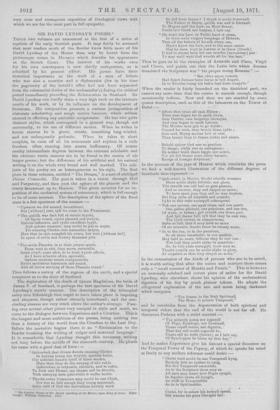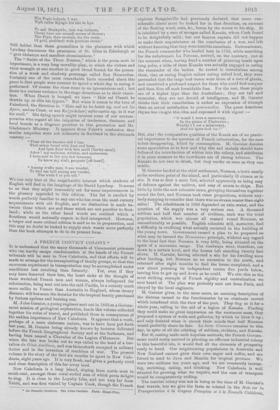SIR DAVID LYNDSAY'S POEMS.*
TiDtSE two volumes are announced as the first of a series of reprints of the early Scottish poets. It may fairly be assumed that most readers south of the Border know little more of Sir David Lyndsay of the Mount than may bo learnt from the picturesque verses in Marmion which describe his appearance at the Scotch Court. The interest of his works even for his owu countrymen is now chiefly antiquarian, as is admitted by his present editor. His poems have their historical importance as the work of a man of letters who was also a courtier and a diplomatist (for in his time the pageantry of the herald's &lice had not been separated from the substantial duties of the ambassador's) (luring the critical period immediately preceding the Reformation in Scotland. Sir David Lyndsay can hardly claim a very high rank on the intrinsic merits of his work, or by its influence on the development of
literature. His composition presents a curious juxtaposition of elaborate scholarship and rough native humour, which seldom
succeed in effecting any amicable compromise. He has two quite distinct styles, which correspond in a general way, though not universally, to his use of different metres. When he writes in heroic stanzas he is grave, ornate, something long-winded,
and not unfrequently pedantic. When lie takes to short couplets, he casts off all his ornaments and rejoices in a rude freedom often running into coarse buffoonery. Of course sundry intermediate degrees between the extreme scholastic and
the extreme rustic manner are to be found in the course of nie longer poems; but the difference of his artificial and his natural writing is on the whole very broad and well marked. The sub- jects of his poetry are as heterogeneous as his style. The first piece in these volumes, entitled " The Dream," is a sort of abridged Divine Cwamediai. The poet is taken in a vision through Hell and Purgatory, and then past the sphere of the planets and dm starry firmament up to Heaven. This gives occasion for an ex- position of the mediaeval system of astronomy, which is full enough to be of some interest. The description of the sphere of the fixed stars is a fair specimen of the manner :— "Upwarte we did ascend, incontinent,
But [without] rest, tyll we come to the Firmament.
"The quhilk was flxit full of sterris brycht,
Of flgour round, rycht plesand and porfyto, Quhoso influence, and rycht excellent lyght, And qubose nummer, may nocht be put in wryte. Yit cunning Clorkis dais naturallye indyie, How that he doll compleit his coma, but weir [without fail], In space of sevin and throtty thousand ycir.
"The sovin Planet's, in to their proper spells, From west te eist, they move, naturallio, Some swyft, some slew, as to their kyndo ufforia, As I have nchawin afore, speciallio, Quhoso motioun ceusis contyneuallie Rycht melodious barmonie and sound, And all throw movyng of those Planedie round."
Then follows a survey of the regions of the earth, and a special complaint as to the state of Scotland.
The deploration of the death of Queen Magdalene, the bride of James V. of Scotland, is perhaps the best specimen of Sir David Lyndsay's stately manner. The description of the triumphal entry into Edinburgh that ought to have taken place is imposing and eloquent, though rather clumsily introduced ; and the con- cluding stanzas are very much above the author's average. Pass- ing over several other pieces very unequal in style and merit, we come to the dialogue between Experience and a Courtier. This is the longest and most ambitious of the poems, being nothing less ' than a history of the world from the Creation to the Last Day. Before the narrative begins there is an " Exclamation to the Reader touching the writing of vulgar and maternal language." It is remarkable that Lyudsay thought this necessary, writing not long before the middle of the sixteenth century. lie pleads his cause with a good deal of force :— "Quliewheit that divers devote cunning Clorkis
Iu Latyne toung has wryttin syndrie bukis, Our unlernit knawis lytill of those workis,
More than they do the ravyng of the rukis. Quharefore to colyearia, cairtitris, and to cult's, To Jock and Thome, my rhyme sail be clirectit, 'With cunuyng men quhowboit it wylbo " Thocht every Commoun may nocht be one Clerk, Nor has no laid except their toting maternal], Quhy suld of God the marvellous 'mainly work
* Y'Ite l'oeitcal Works of mr Dada Ipidgay of the Meant, byon King of Arms. Edin- burgh: wintam Paterson. 1871.
Be hid from theme? I thynk it Doubt Internal'. The Father of Hevin, quhillt was and is Eternal!, To Moysos gait the Law, on Mont Sonny, Nocht into Groik nor Latyne, I heir say.
"He wrait the Law, in Tablie hard of stone, In there awin vitigaro language of Hebrew, That all the hairnis of Israeli, every one, Mycht know the Lew, and so the same onsew.
Had tie done wryt in Latyne or in Grow [Greek] It had to theme boon hot one sawrien [savourless] jest: Ye may weill wytt God wrooht all for the best."
Then he goes on to the examples of Aristotle and Plato, Virgil and Cicero, and points out that the Latin into which Jerome translated the Scriptures was " his proper toting Romano" :—
"Bot, oar myno conceit,
Had Scoot Joromebono borne in tyll Argyle, In to Yrischo toung his bukis had done cowpyle."
When the reader is fairly launched on the histdrical part, we cannot say more than that the course is smooth enough, though occasionally tedious. Now and then we are startled by some quaint description, such as this of the labourers on the Tower of Babel :—
"Afforo that tymo all spak Ebrew ;
Than sum begun for to spoilt Grew, Sum Dutcho, sum language Sarazyne, And sumu began to spoilt Layne.
The Meister men gm to go wylde ; Cryand for train, they brocht them tylde ; Sum said, Bryng mortar heir at onis, Than brocht they to theme stokis and stonis.
Behold pillow God woe so gratioue To theme, whilk wer so outragious ; Ho nether braik there leggin nor Nov yit did theme none tither hermit:, Except of toungis divysioun."
In the account of the joys of Heaven which concludes the poem we find a well-known illustration of the different degrees of beatitude thus expressed :—
"Qahowboit, in Hovyn, thoeht overillt creature
have nocbt alyke felicitio, nor glare, Yilt overilk one sell hail so grot plesurc,
And so content, they sail desyre no more; To have more joyo they sail no way implore,
Bot they salbe all satysfeit and content, Lyko to this rude oxempyll subsequent.
"Tak too crowat, one pynt atepe, and one quart:, One gallon pitchuir, one punsioun, and one tun, Of wyne, or balmo ; gyf everilk one there part,
And fyll theme full, tyll that they be ouir run,
The lytill crowat, in comparisoun, Salbe so full, that it may bald no more Of sic misouria, thocbt there be twenty score.
" In to the tun, or in the punsioun, Ho all those veesebellis, in one qualitie, Mey hold no more, without they be ouir run ; 'Yitt hail they nocht alyko in quantitie : So. be this rude exempyll, thew may se, Theolit ovorilk one be Dealt alyko in glare,
Ar sat ysfoit so that they desyro no more."
Iu the enumeration of the kinds of persons who are to be saved, it is worth noting that after the saints and martyrs there comes only a "shall numiner of Monkis and Freiris." This is however an unusually subdued and covert piece of satire for Sir David Lyndsay, who elsewhere shows his opinion of the ecclesiastical dignities of his day by ,much plainer tokens. Ho adopts this allegorical explanation of the sun and moon being darkened which compares
"The Sonne, to the Stait Spirltuall, Tho Mono, to princis Tomporall," and be concludes from the degeneration of both spiritual and temporal rulers that the end of the world is not far off. He threatens Prelates with a strict account :— " The princely pomp nor apparel) Of Pope, Bysohope, nor Cardinal], There royal' rontis, nor dignitie, That day sail nocht regardit be. There sail no tailis [trains], as I heir Ray,
Of Byschoppes be borne up that day."
And he makes Experience give his listener a special discourse on the Temporal Power of the Papacy, of which he speaks his mind as freely as any modern reformer could desire :— " Christ weld nocht be ono Temporal' kyng,
Rychely into no roalmo to ryng, Bet fled Tamper:ill auctoritio, As in the Scripture thaw may so. All men may knaw how Popes ryngie, In dignitie abate all ityngis, As woill in Temporalitio As in to Spirituttlitio.
Christ, for to Bellew his humyll spreit, Didwasebe his pure Disciplis felt:
The Popis holynia, I wys,
Wyll suffer Kyngia his felt to kys.
To saif Mankynde, that wos forlorne, Christ bure one crouch crown of thorne'; The Popo, thre orownie, for the flouts, Of gold, pouldorit with protioua stems."
Still bolder than these generalities is the plainness with which Lyudsay denounces the procession of St. Giles in Edinburgh as " gret idolatrye and manifest abominatioun."
The " Satire of the Three Estates," which is the poem next in importance, is a very long morality-play, in which the virtues and vices wrangle at one another in good broad Scotch for the posses- sion of a weak and shadowy personage called Rex Humanitas. Certainly one of the most remarkable facts recorded about this piece is that people were content to spend a whole day in seeing it performed. Of course the vices come to an ignominious end ; but there isa curious variance in the stage directions as to their execu- tion. When Deceit is hanged, we have " Heir sal Dissait be drawin up, or ellis his fygure." But when it comes to the turn of Falsehood, the direction is, " Heir sail he be boisit up, and not his figure, and an Craw, or ane Ke [jackdaw] salbe origin up, as it war his null." His dying speech might interest some of our contem- poraries who regard all the iniquities of tradesmen, dustmen, and local boards as a disgrace peculiar to this generation and Mr. Gladstone's Ministry. It appears from Falset's confession that similar iniquities were not unknown in Scotland iu the sixteenth century :--
"Than all the baxtere will I ban,
That mixes bread with dust and bran, And fyne flour with boir maill (barley-meal]. Adew my maistors, wrichts, and maiasouns, I have neir to heir you few lessouns, Ye know my craft, porqueir [off-hand].
"Among crafts mon, it ace wonder, To find ten leill among ace hander, The truth I to you toll."
We can only hint at the cortsiderable interest which students of English will find in the language of Sir David Lyndsay. It seems to us that they might reasonably ask for some improvements in the glossary appended to this edition. The list is swelled by words perfectly familiar to any one who has even the most cursory acquaintance with old English, and no distinction is made be- tween those which are and those which are not peculiar to Scot- land ; while on the other hand words are omitted which a
Southron would naturally expect to find interpreted. However, a larger and more critical edition is said to be in preparation, and this may no doubt be looked to supply such wants more perfectly than the book attempts to do in its present form.































 Previous page
Previous page